The AMD 3rd Gen Ryzen Deep Dive Review: 3700X and 3900X Raising The Bar
by Andrei Frumusanu & Gavin Bonshor on July 7, 2019 9:00 AM EST** = Old results marked were performed with the original BIOS & boost behaviour as published on 7/7.
Benchmarking Performance: CPU Legacy Tests
3DPM v1: Naïve Code Variant of 3DPM v2.1
The first legacy test in the suite is the first version of our 3DPM benchmark. This is the ultimate naïve version of the code, as if it was written by scientist with no knowledge of how computer hardware, compilers, or optimization works (which in fact, it was at the start). This represents a large body of scientific simulation out in the wild, where getting the answer is more important than it being fast (getting a result in 4 days is acceptable if it’s correct, rather than sending someone away for a year to learn to code and getting the result in 5 minutes).
In this version, the only real optimization was in the compiler flags (-O2, -fp:fast), compiling it in release mode, and enabling OpenMP in the main compute loops. The loops were not configured for function size, and one of the key slowdowns is false sharing in the cache. It also has long dependency chains based on the random number generation, which leads to relatively poor performance on specific compute microarchitectures.
3DPM v1 can be downloaded with our 3DPM v2 code here: 3DPMv2.1.rar (13.0 MB)
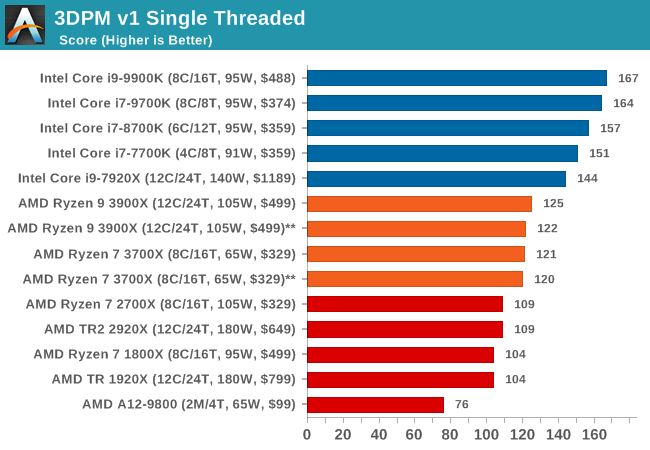
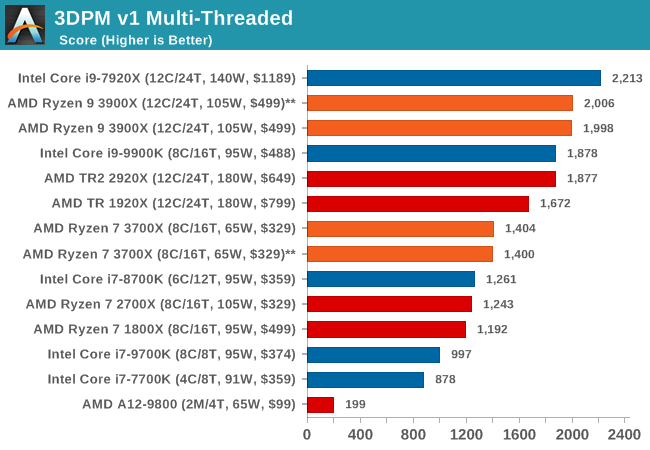
x264 HD 3.0: Older Transcode Test
This transcoding test is super old, and was used by Anand back in the day of Pentium 4 and Athlon II processors. Here a standardized 720p video is transcoded with a two-pass conversion, with the benchmark showing the frames-per-second of each pass. This benchmark is single-threaded, and between some micro-architectures we seem to actually hit an instructions-per-clock wall.
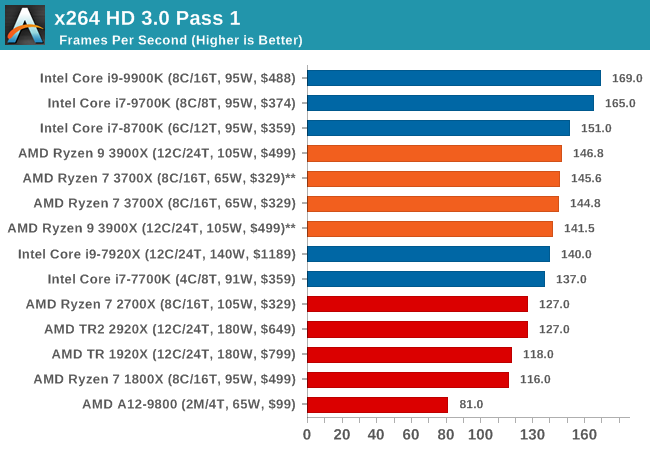
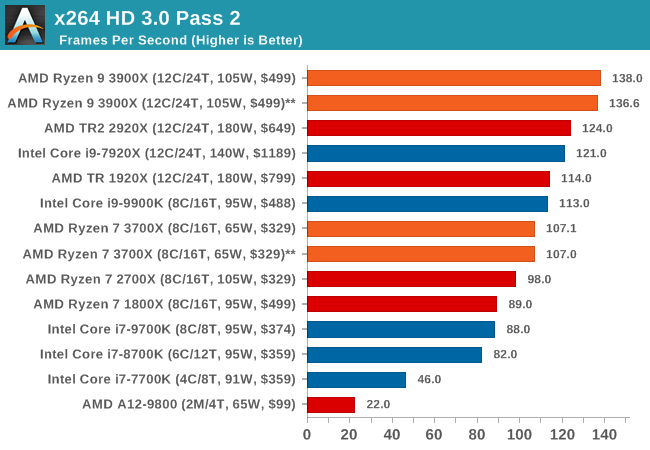
CineBench 11.5 and 10
Cinebench is a widely known benchmarking tool for measuring performance relative to MAXON's animation software Cinema 4D. Cinebench has been optimized over a decade and focuses on purely CPU horsepower, meaning if there is a discrepancy in pure throughput characteristics, Cinebench is likely to show that discrepancy. Arguably other software doesn't make use of all the tools available, so the real world relevance might purely be academic, but given our large database of data for Cinebench it seems difficult to ignore a small five minute test. We run the modern version 15 in this test, as well as the older 11.5 due to our back data.
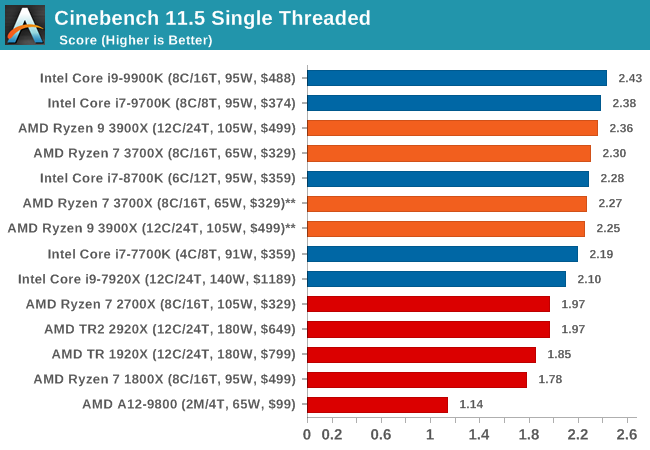
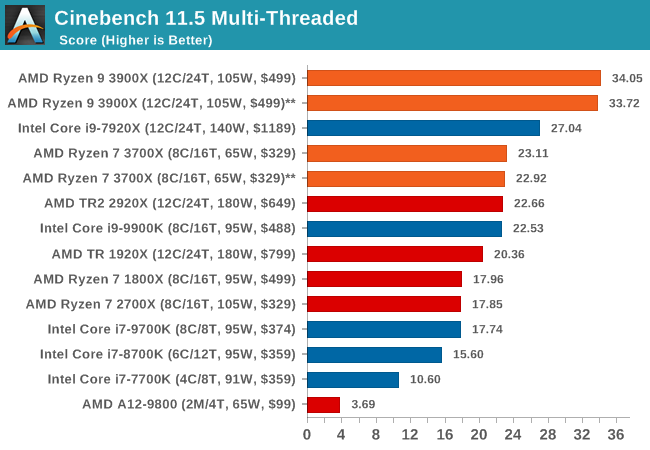










447 Comments
View All Comments
Tkan215 - Monday, July 8, 2019 - link
I dont think so its not easy to refine 10nm like you think how many year it take Intel to refine 10nm it has been already 4 to 5 years dont get your hope up. If volume aint there there is no chance. AMD surelly moving to 7nm euv quicker then 5nmTkan215 - Monday, July 8, 2019 - link
I havent seen them drop any price i9900k went back up at amazon.com. Intel continue to ignore, non response and not caring for their competition. they want their margin this is all this company care about not your feeling or desireTEAMSWITCHER - Sunday, July 7, 2019 - link
It's summer time in Michigan and I have no desire to upgrade right now... I can wait for the flagship 3950X in September.Maxiking - Sunday, July 7, 2019 - link
Local anandtech yield and node experts got hit again. I wonder how many hits you can take before you shut up.As predicted, Intel still faster in games and AMD OC ability more or less unchanged, slighty worse. It is a new node after all buy yeah, you know better, so keep dreaming about those 5ghz on the majority of chips.
Teckk - Sunday, July 7, 2019 - link
So more cores at the same TDP as 2000 series Ryzen is nothing? Ok.Maxiking - Sunday, July 7, 2019 - link
That isn't the thing I was talking about. My point was that local experts, I mean, trolls, know nothing about the manufacturing cost, yields, about the node in general. As it has been showed recently in the reviews, OC ability of the chips is terrible and lower core count parts tend to perform worse, reaching only 4.1 - 4.2 ghz.Teckk - Sunday, July 7, 2019 - link
Ah, got it. It is an improvement, but not good enough.Maxiking - Sunday, July 7, 2019 - link
It is good enough in terms of competition and that we can get things cheaper.But not when the raw performance is tconsidered. It is a hypothetical scenario, but had there been no 10 nm problems for Intel, AMD would have been in the bulldozer position again.
catavalon21 - Sunday, July 7, 2019 - link
I haven't owned an AMD CPU since my K500 a very long time ago, but let's call it what it is - AMD has a CPU at the $500 price point that Intel is charging $1200 presently to compete with, and Intel's solution uses far more power. That's a win for AMD in any domain.imaheadcase - Sunday, July 7, 2019 - link
The problem is that the PC market is stagnant atm, if you are already a intel owner, absolutely no reason to upgrade to amd CPU. Most people who have systems now don't really have any need to upgrade like it used to be.He stated in article it took amd 15 YEARS to get this good CPU finally out and sounded like he was impressed by that?
Its a impressive CPU, but lets be real here, Intel has dominated the market already for years because it has better marketing, better suppliers.
Based on previous article comments, most people are still rocking 2600K CPU..FROM 2011! They still are very good CPU.
Thats not counting the price difference, while yes the one intel cpu is crazy expensive, its not a normal CPU most people have to go by, if you a regular user with the previous mentioned 2600K CPU..that requires a total system overhaul if you wanted to go AMD route...which to be honest is a risk on betting that a new amd system is not going to last as long as a 2600K did for you.